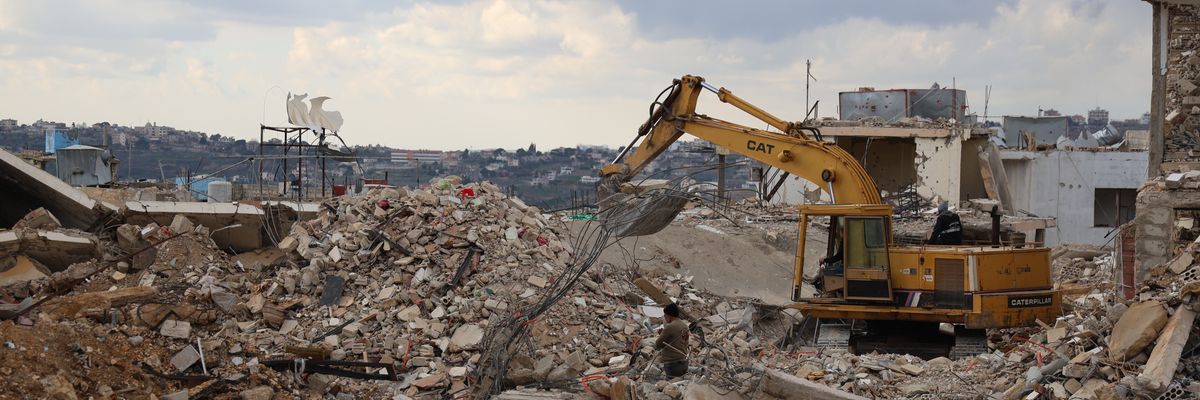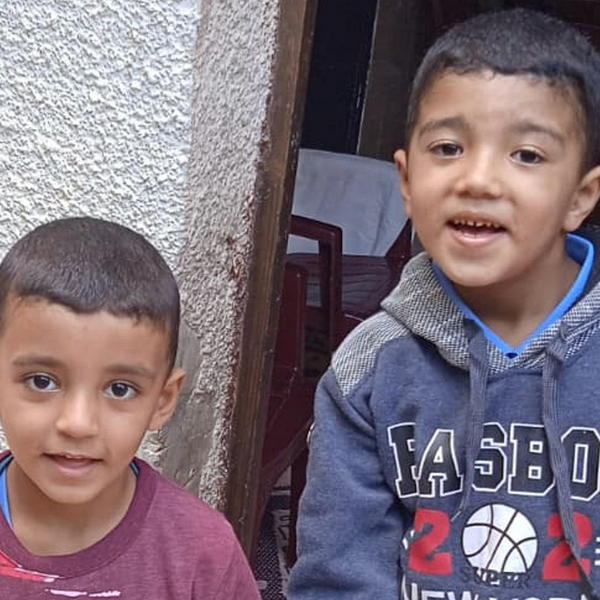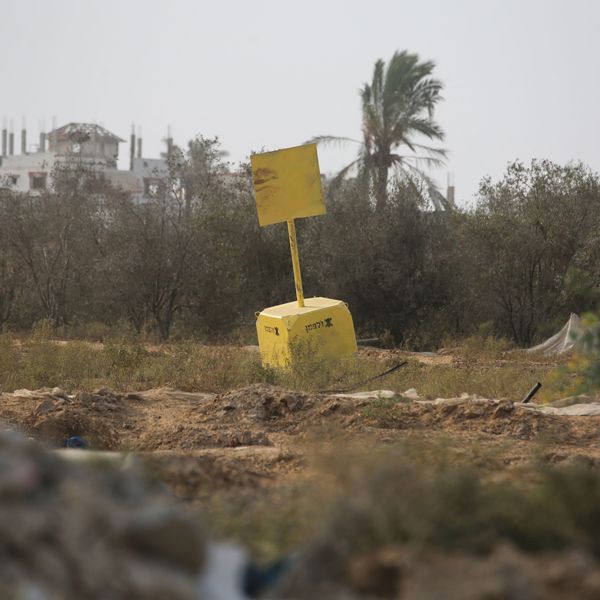
Destruction resulting from Israeli attacks is seen as citizens return to their homes in Al-Khiyam town, Nabatieh Governorate of southern Lebanon on January 23, 2025.
Violating Cease-Fire Deal, Israel Won't Withdraw Troops From Lebanon Before Deadline
"A renewal of hostilities would be a devastating blow for civilians still struggling to rebuild their lives," said one humanitarian worker.
The Trump administration on Friday called for a "short, temporary cease-fire extension" between Israel and Lebanon after Israeli Prime Minister Benjamin Netanyahu said the country's troops will not complete its withdrawal from southern Lebanon as it agreed to in a 60-day truce that began in late November.
Under the terms of the cease-fire, Israel agreed to withdraw its military from southern Lebanon by January 26, and the Lebanese political and paramilitary group Hezbollah was required to move its forces north of the Litani River and dismantle all military infrastructure in the south.
Netanyahu's office claimed Friday that "the cease-fire agreement has not yet been fully enforced by the Lebanese state" and said its "gradual withdrawal process will continue, in full coordination with the United States."
Israel asserted that the truce allowed for the withdrawal process to "continue beyond 60 days—a claim the Lebanese government and Hezbollah refuted—and claimed the Lebanese army had allowed Hezbollah to regroup since the cease-fire began.
Hezbollah called Israel's plan to maintain a military presence in southern Lebanon past the deadline a "blatant violation of the agreement."
As Hezbollah warned it would consider the cease-fire null and void if Israel does not withdraw by January 26, White House National Security Council spokesperson Brian Hughes said an extension of the deadline is "urgently needed."
Emile Hokayem of the International Institute for Strategic Studies said Israel's "unilteral extension... is clearly a violation of the November cease-fire," while Lebanese American journalist Rania Khalek noted that Israel "has been violating the cease-fire the entire time with zero international condemnation."
The Norwegian Refugee Council (NRC) said that while the cease-fire has significantly reduced casualties in Lebanon following 14 months of fighting between the Israel Defense Forces and Hezbollah, at least 29 civilians have been killed since the truce began.
"While the cease-fire seems intact on paper, civilians in Lebanon continued to be killed and their homes blown up by the Israeli military," said Maureen Philippon, Lebanon country director for the NRC.
Prior to the cease-fire deal in November, the conflict killed at least 3,823 people and injured 15,859, as well as displacing tens of thousands of people in Israel and over 1 million in Lebanon. More than 100,000 people in Lebanon have still been unable to return to their homes.
"We have been displaced from our village for 16 months," a Lebanese citizen named Rakad, who fled the border town of Yarine, told the NRC. "We are all waiting for the 27th to go back, kiss the soil of our land, and breathe the air of our village."
Israel's likely delay in withdrawing troops comes as Lebanese residents have begun returning to their villages in the south, but the Lebanese military on Friday called on civilians not to return to the coastal town of Naquora, which Mayor Abbas Awada told Al Jazeera "has become a disaster zone of a town."
"The bare necessities of life are absent here," said the mayor.
The NRC warned that the "continued presence of Israeli troops in dozens of villages in southern Lebanon severely restricts the freedom of movement and leaves many in a prolonged state of displacement."
Philippon called on regional and international mediators to "ensure this truce evolves into a lasting cease-fire, with a firm commitment to protecting all civilians and civilian infrastructure."
"A renewal of hostilities would be a devastating blow for civilians still struggling to rebuild their lives," said Philippon. "Lebanese villagers are still being warned against returning to their homes and lands, while many others don't even know what happened to the house they left months ago. These people will need all the stability and support they can get to get back on their feet after. Israel must withdraw from these villages so that thousands can go back."
An Urgent Message From Our Co-Founder
Dear Common Dreams reader, The U.S. is on a fast track to authoritarianism like nothing I've ever seen. Meanwhile, corporate news outlets are utterly capitulating to Trump, twisting their coverage to avoid drawing his ire while lining up to stuff cash in his pockets. That's why I believe that Common Dreams is doing the best and most consequential reporting that we've ever done. Our small but mighty team is a progressive reporting powerhouse, covering the news every day that the corporate media never will. Our mission has always been simple: To inform. To inspire. And to ignite change for the common good. Now here's the key piece that I want all our readers to understand: None of this would be possible without your financial support. That's not just some fundraising cliche. It's the absolute and literal truth. We don't accept corporate advertising and never will. We don't have a paywall because we don't think people should be blocked from critical news based on their ability to pay. Everything we do is funded by the donations of readers like you. Will you donate now to help power the nonprofit, independent reporting of Common Dreams? Thank you for being a vital member of our community. Together, we can keep independent journalism alive when it’s needed most. - Craig Brown, Co-founder |
The Trump administration on Friday called for a "short, temporary cease-fire extension" between Israel and Lebanon after Israeli Prime Minister Benjamin Netanyahu said the country's troops will not complete its withdrawal from southern Lebanon as it agreed to in a 60-day truce that began in late November.
Under the terms of the cease-fire, Israel agreed to withdraw its military from southern Lebanon by January 26, and the Lebanese political and paramilitary group Hezbollah was required to move its forces north of the Litani River and dismantle all military infrastructure in the south.
Netanyahu's office claimed Friday that "the cease-fire agreement has not yet been fully enforced by the Lebanese state" and said its "gradual withdrawal process will continue, in full coordination with the United States."
Israel asserted that the truce allowed for the withdrawal process to "continue beyond 60 days—a claim the Lebanese government and Hezbollah refuted—and claimed the Lebanese army had allowed Hezbollah to regroup since the cease-fire began.
Hezbollah called Israel's plan to maintain a military presence in southern Lebanon past the deadline a "blatant violation of the agreement."
As Hezbollah warned it would consider the cease-fire null and void if Israel does not withdraw by January 26, White House National Security Council spokesperson Brian Hughes said an extension of the deadline is "urgently needed."
Emile Hokayem of the International Institute for Strategic Studies said Israel's "unilteral extension... is clearly a violation of the November cease-fire," while Lebanese American journalist Rania Khalek noted that Israel "has been violating the cease-fire the entire time with zero international condemnation."
The Norwegian Refugee Council (NRC) said that while the cease-fire has significantly reduced casualties in Lebanon following 14 months of fighting between the Israel Defense Forces and Hezbollah, at least 29 civilians have been killed since the truce began.
"While the cease-fire seems intact on paper, civilians in Lebanon continued to be killed and their homes blown up by the Israeli military," said Maureen Philippon, Lebanon country director for the NRC.
Prior to the cease-fire deal in November, the conflict killed at least 3,823 people and injured 15,859, as well as displacing tens of thousands of people in Israel and over 1 million in Lebanon. More than 100,000 people in Lebanon have still been unable to return to their homes.
"We have been displaced from our village for 16 months," a Lebanese citizen named Rakad, who fled the border town of Yarine, told the NRC. "We are all waiting for the 27th to go back, kiss the soil of our land, and breathe the air of our village."
Israel's likely delay in withdrawing troops comes as Lebanese residents have begun returning to their villages in the south, but the Lebanese military on Friday called on civilians not to return to the coastal town of Naquora, which Mayor Abbas Awada told Al Jazeera "has become a disaster zone of a town."
"The bare necessities of life are absent here," said the mayor.
The NRC warned that the "continued presence of Israeli troops in dozens of villages in southern Lebanon severely restricts the freedom of movement and leaves many in a prolonged state of displacement."
Philippon called on regional and international mediators to "ensure this truce evolves into a lasting cease-fire, with a firm commitment to protecting all civilians and civilian infrastructure."
"A renewal of hostilities would be a devastating blow for civilians still struggling to rebuild their lives," said Philippon. "Lebanese villagers are still being warned against returning to their homes and lands, while many others don't even know what happened to the house they left months ago. These people will need all the stability and support they can get to get back on their feet after. Israel must withdraw from these villages so that thousands can go back."
The Trump administration on Friday called for a "short, temporary cease-fire extension" between Israel and Lebanon after Israeli Prime Minister Benjamin Netanyahu said the country's troops will not complete its withdrawal from southern Lebanon as it agreed to in a 60-day truce that began in late November.
Under the terms of the cease-fire, Israel agreed to withdraw its military from southern Lebanon by January 26, and the Lebanese political and paramilitary group Hezbollah was required to move its forces north of the Litani River and dismantle all military infrastructure in the south.
Netanyahu's office claimed Friday that "the cease-fire agreement has not yet been fully enforced by the Lebanese state" and said its "gradual withdrawal process will continue, in full coordination with the United States."
Israel asserted that the truce allowed for the withdrawal process to "continue beyond 60 days—a claim the Lebanese government and Hezbollah refuted—and claimed the Lebanese army had allowed Hezbollah to regroup since the cease-fire began.
Hezbollah called Israel's plan to maintain a military presence in southern Lebanon past the deadline a "blatant violation of the agreement."
As Hezbollah warned it would consider the cease-fire null and void if Israel does not withdraw by January 26, White House National Security Council spokesperson Brian Hughes said an extension of the deadline is "urgently needed."
Emile Hokayem of the International Institute for Strategic Studies said Israel's "unilteral extension... is clearly a violation of the November cease-fire," while Lebanese American journalist Rania Khalek noted that Israel "has been violating the cease-fire the entire time with zero international condemnation."
The Norwegian Refugee Council (NRC) said that while the cease-fire has significantly reduced casualties in Lebanon following 14 months of fighting between the Israel Defense Forces and Hezbollah, at least 29 civilians have been killed since the truce began.
"While the cease-fire seems intact on paper, civilians in Lebanon continued to be killed and their homes blown up by the Israeli military," said Maureen Philippon, Lebanon country director for the NRC.
Prior to the cease-fire deal in November, the conflict killed at least 3,823 people and injured 15,859, as well as displacing tens of thousands of people in Israel and over 1 million in Lebanon. More than 100,000 people in Lebanon have still been unable to return to their homes.
"We have been displaced from our village for 16 months," a Lebanese citizen named Rakad, who fled the border town of Yarine, told the NRC. "We are all waiting for the 27th to go back, kiss the soil of our land, and breathe the air of our village."
Israel's likely delay in withdrawing troops comes as Lebanese residents have begun returning to their villages in the south, but the Lebanese military on Friday called on civilians not to return to the coastal town of Naquora, which Mayor Abbas Awada told Al Jazeera "has become a disaster zone of a town."
"The bare necessities of life are absent here," said the mayor.
The NRC warned that the "continued presence of Israeli troops in dozens of villages in southern Lebanon severely restricts the freedom of movement and leaves many in a prolonged state of displacement."
Philippon called on regional and international mediators to "ensure this truce evolves into a lasting cease-fire, with a firm commitment to protecting all civilians and civilian infrastructure."
"A renewal of hostilities would be a devastating blow for civilians still struggling to rebuild their lives," said Philippon. "Lebanese villagers are still being warned against returning to their homes and lands, while many others don't even know what happened to the house they left months ago. These people will need all the stability and support they can get to get back on their feet after. Israel must withdraw from these villages so that thousands can go back."

